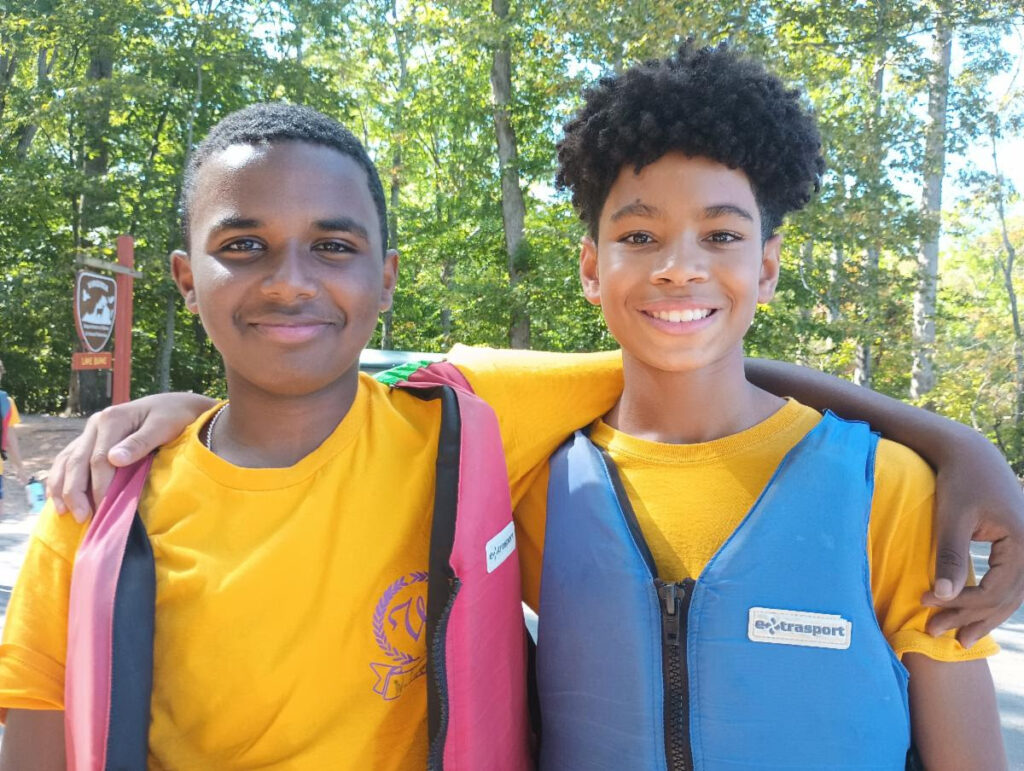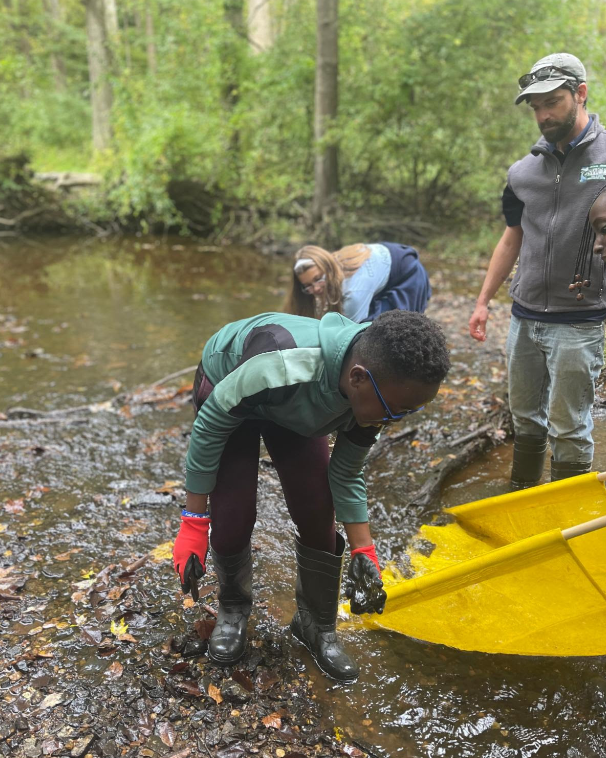Why Westminster School Prizes Outdoor Time in the Learning Process

In today’s fast-paced world, digital distractions abound, and indoor activities dominate. Especially for young children, it’s increasingly important to recognize the benefits of outdoor time. According to the article “Creativity in the Wild: Improving Creative Reasoning through Immersion in Natural Settings,” children “spend only 15–25 minutes a day in outdoor play and sports,” and there’s been an “18–25% decline in nature-based recreation since 1981.”
While many parents acknowledge the negative ramifications of this, busy schedules often leave families with less time to spend outdoors.
Nestled within a seven-acre campus, Westminster School in Annandale, Virginia, provides its students with opportunities for both structured and unstructured outdoor time.
Outdoor Time for All Students
Schools with outdoor spaces, playgrounds, and playing fields can harness these resources to elevate and to enrich student experiences. Westminster School has the unique opportunity to provide students with inspiring indoor and outdoor environments. Learning, play, and growth all occur as students enjoy daily recess, physical education, and various outdoor excursions.
Westminster School even has an outdoor classroom. It was given to the school as the graduating gift of the class of 2022. Westminster teachers can reserve this established space to teach a lesson outside at beautiful umbrella-covered tables. There’s also a permanent whiteboard for the teacher to use. Flower pots surround the space, and tall, leafy trees provide shade and beauty.
The Benefits of Outdoor Time for Students

Discover what the research says about how outdoor time positively impacts children’s development and well-being.
Enhances Academic Performance
Numerous studies reveal that outdoor experiences contribute to improved academic performance. The research shows this is especially true in science subjects.
Engaging in hands-on outdoor activities allows children to grasp complex scientific concepts better, enhancing their understanding and retention of knowledge.
Promotes Physical Health
Outdoor recreation increases physical activity among students.
Outdoor time leads to:
- Increased motor skills
- Improved cardiovascular health
- Reduced obesity rates
- Healthy growth
Research highlights the positive impact of outdoor play on overall physical fitness and motor skill development in young learners. Regular exposure to fresh air and sunlight contributes to physically and mentally healthier children who are more inclined to appreciate and participate in outdoor activities.
Other Benefits
Nurtures Mental Health and Well-Being
Incorporating outdoor time and nature-based experiences into the educational setting fosters healthy emotional and mental wellness. Students gain confidence when they venture out to explore. This increases their independence while also satisfying their curiosity about the world around them.
Studies demonstrate that exposure to green spaces and spending time in nature:
- Improves psychological well-being and boosts happiness
- Contributes to a positive and balanced state of mind
- Reduces stress, anxiety, and depression
- Restores attention
- Improves mindfulness
- Inspires awe and wonder
- Promotes positive body image
When young children disconnect from screens and engage with the natural environment, they can think more clearly and be more aware of their bodies and minds.
Makes Learning Science More Enjoyable
When there’s an outdoor element to learning science, students become better connected to the natural world and cultivate a deeper appreciation of the subject.
Studies show that learning outdoors:
- Increases content knowledge
- Helps students retains information
- Offers better insight into scientific methodologies
- Promotes pro-environmental behaviors
As one example, Westminster kindergarteners enjoyed a nature hike last September. During the outing, they honed their observation skills and searched for natural items on their list, including ladybugs and acorns.
Last October, kindergarten students also embarked on a science field trip to Green Meadows Farm. This reinforced the concepts about farming and farm animals they had learned in the classroom. Over the course of the day, the students enjoyed a delicious lunch, a delightful hayride, and hands-on time with the farm animals.
Noteworthy Benefits of Outdoor Time
Provides a Fresh Context for Learning
Being immersed in nature offers ample opportunities to see things from a different perspective and engage with the world differently.
A new environment engages students by providing:
- Real-life applications of knowledge
- Multi-sensory engagement
- Contextual understanding
- Multidisciplinary connections
- Critical thinking
- Problem-solving
- Open-ended exploration
- Environmental awareness
- Cultural and historical context
- A life-long love of learning
- A sense of wonder
For example, observing ants in their natural habitat gives students insights into their intricate community dynamics. This thoughtful examination, coupled with instruction, helps students better understand social organization and collaboration.
Even outdoor picnic lunches can offer students a much-needed break from routine. These outings lend themselves to informal conversations, social bonding, and learning opportunities. Occasionally, Westminster kindergarteners enjoy lunch outside and relish the experiences of watching bugs and engaging in social interactions.
Westminster’s second-grade students also ventured outside for a geography lesson focused on the unique features of the US Northeast. The fall weather enhanced this lesson as they learned about the region’s physical characteristics and culture.
The most striking example, however, was the field trip the sixth-graders took with Mr. Cecil and Mrs. Foster to the Chesapeake Bay Foundation (CBF) headquarters in Annapolis, Maryland. Students experienced a variety of scientific and nature-based activities throughout the day:
- Saw eco-friendly architecture in action.
- Learned about the Chesapeake Bay and how to help preserve our environment.
- Complied with CBF’s zero-trash policy.
- Learned canoe safety and rowing basics.
- Canoed among ospreys and ducks.
- Put on waders and discovered crabs, fish, shrimp, and jellyfish.
After being immersed in nature and learning about the incredible work scientists and environmentalists are doing to save the planet, many students were inspired to pursue volunteer work or to attend a CBF-sponsored camp.
Offers a Better Scope of STEAM Skills
STEAM (science, technology, engineering, arts, and mathematics) has become an essential component of a well-rounded education.
Time outdoors provides a natural setting to deepen students’ scientific understanding. It helps them build essential science skills, such as:
- Observation
- Classification
- Communication
- Inference
Simple activities lend themselves to interdisciplinary projects. For example, after Mme Peev dove into the culinary customs of French culture with Westminster’s second-graders, she then took them to the National Herb Garden at the National Arboretum in Washington, DC. Once there, students could identify and sketch the herbs Mme Peev had been discussing in class. Students wrote down their names in French, English, and Latin and discovered the unique look, feel, and smell of each herb. This one immersive lesson combined language skills, cooking, art, and general observation.
Similarly, Mrs. Spencer kicked off the start of fall with the second-graders at Butler’s Orchard. Students gathered apples, rode a tractor on a journey to pick out their own pumpkins, used their critical thinking skills to get out of a tricky corn maze, and enjoyed the thrill of sliding down high slides on burlap sacks. One of the highlights of the field trip was petting the sheep, goats, and pigs that live at the orchard. This field trip marks the beginning of the annual second-grade Apple Lab for science and math classes. During this activity, students measure their apples’ circumference and weight each day and complete several different science experiments with them over the course of two weeks. Westminster teachers even link this activity to literature with poems inspired by the field trip.
These kinds of cross-disciplinary activities foster creativity, problem-solving, and innovation. Time outdoors provides students with many opportunities to develop these essential skills in a fun, engaging way.
Is Westminster School Right for Your Family?
Westminster School is dedicated to providing the highest quality elementary and middle school education. Westminster aims to propel each student to academic excellence while fostering a well-rounded education and developing individual character.
Parents interested in private education in Virginia can contact us at (703) 256-3620 or by email at admissions@westminsterschool.com.

